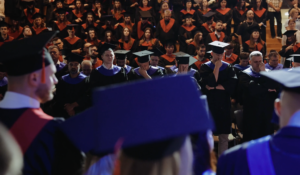
NASHVILLE, Tenn. (BP)–“Accessible means you can enter; inclusive means you are welcome.”
Though the definitions are not her own, Sara Ezell can testify to their accuracy. And while accessibility has legal connotations, Ezell, a project manager for a research grant at Vanderbilt University in Nashville, Tenn., wants to see church-sponsored services like media centers exceed accessibility by becoming inclusive.
Speaking to participants in the National Seminar for Church Librarians and Historians, March 19-20 at the Sunday School Board of the Southern Baptist Convention, she encouraged “placing value on the person and making the disability secondary.”
Ezell speaks from experience. She was born with a disorder that resulted in brittle bones. In her 26 years, she estimates she has had “close to 200 broken bones.”
Having completed both undergraduate and postgraduate degrees in special education, she speaks not only for herself but also for others whose impairments vary but who have common needs.
While having a specific impairment results in specific needs, she told conference participants that in all cases they should not only provide assistance as needed or requested, but also ask the person what services would be helpful.
“Persons who have impairments are, first of all, persons,” she reminded conferees. “Offer assistance, if only to introduce yourself by name and church responsibility, adding, ‘Let me know if I can do anything to assist you.'” On the other hand, she cautioned, do not assume that a person with one impairment also has other impairments. Such assumptions can lead to embarrassing situations, such as speaking in a loud voice to those who cannot see well.
For specific impairments, Ezell offered a list of do’s and don’ts:
Visual impairments — Do orient people to the media center environment and provide materials in alternative formats. Don’t be afraid of words like “look” and “see,” which visually impaired people also use. And don’t clutter the library unnecessarily or abruptly change the arrangement of the library.
Hearing impairments — Do learn about their communication method and speak at eye level for those who lip read. Don’t assume they cannot communicate, speak from behind the person or use loud or exaggerated speech.
Physical impairments — Do be creative and open-minded and make materials accessible to the individual. Don’t think “it can’t be done,” put materials out of reach or hover unnecessarily.
Cognitive impairments — Do be open to different learning styles and encourage enjoyment of the library. Don’t overemphasize disability, underestimate contributions to be made or create “impossible” situations.
For media library staff and other church leaders who want to learn about specific disabilities of people they regularly serve, she suggests first asking the individual. Additional research, once the specific impairment is known, may be done on the Internet; through books or magazine articles; through professionals, college or graduate students in the church; and through community organizations.
For those who may be insecure in a first experience relating to people with disabilities, Ezell said, “Remember Jesus didn’t interact only with the beautiful and perfect people. We are called biblically to serve everyone.”
The National Seminar for Church Librarians and Historians was sponsored by the Church Media Program of the Sunday School Board.








